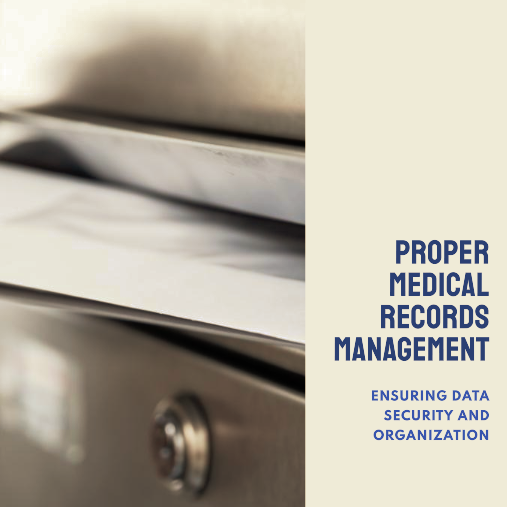
In the intricate realm of the healthcare industry, accurate and efficient management of health records stands as a cornerstone for the successful delivery of patient care. This process, encompassing the creation, receipt, maintenance, and disposition of medical records, presents significant challenges and remarkable opportunities for modern healthcare organizations. Well-managed medical records ensure that valuable patient data are accurate, readily accessible, and secure, paving the way for expedited diagnosis, personalized patient care, and a notable reduction in medical errors. On the other hand, poorly managed health records can elicit many problems, including legal penalties, costly fines, and perhaps most dire, compromised patient safety and confidence. This article delves into the intricacies of health records management, providing an in-depth exploration of its significance, elements, challenges, and the emergence of digital enhancements in this vital healthcare domain.
Table of content
- The Importance of Proper Medical Records Management
- The Role of Patient Relationship Management
- Unraveling the Complexities of Patient Data Life Cycle Management
- Balancing Patient Privacy with Information Management
- The Shift from Paper to Electronic Formats
- Complying with Legal Obligations and State Laws
- Leveraging Technology in Health Records Management
The Importance of Proper Medical Records Management
Medical Records Management is a crucial component of the healthcare industry. It involves handling, storing, and accurately updating medical records, whether paper-based or electronic. These records contain sensitive patient information, including medical histories, treatment procedures, and medication histories. Appropriate management of these records is not just a legal and ethical obligation but also crucial in delivering efficient clinical care and safeguarding patient safety.
For many healthcare providers, one of the critical challenges in managing medical records is shifting from physical records to an electronic health records system. Such a sophisticated approach can reduce missed diagnoses, medication errors, and treatment lapses. Moreover, it streamlines the required tasks and optimizes the time required for healthcare personnel to access relevant data.
However, the transition from paper charts to electronic records comes with its own set of challenges. This includes data breaches, software incompatibility, or administrative errors that could lead to billing errors or even more severe consequences. With the average retention period of a medical record anywhere from two to five years, healthcare providers must ensure they have a secure electronic medical records system that can effectively manage records throughout their data lifecycle.
Subheading: The Role of Patient Relationship Management
Patient Relationship Management in medical records management essentially means how healthcare facilities handle and organize their patients’ medical records. This includes everything from simple tasks, such as filing paper records in office filing cabinets, to more complex procedures, such as maintaining electronic health records and managing billing errors.
Patient Relationship Management is essential to ensure that healthcare providers have all the necessary information when treating patients and can facilitate the exchange of health information between healthcare organizations and other providers. An effective patient relationship management system can help reduce the potential for medication errors and improve patients’ medical records management.
However, unmanaged medical records can result in missed diagnoses, inappropriate treatment, or medication history being overlooked and even trigger legal action. But with an effective management system, healthcare providers can focus more on clinical care and less on managing masses of patient information.
Subheading: Unraveling the Complexities of Patient Data Life Cycle Management
The patient data lifecycle starts from the first time the patient visits a healthcare provider and continues throughout their entire treatment or hospital stay. The cycle also includes the retention period, where data is stored and can be retrieved when required for patient care, and ends with the eventual destruction of data after a certain period.
Healthcare organizations must adopt a robust patient information management system to manage this lifecycle effectively. This includes everything from the collection and storage of data right through to the secure disposal of records.
Efficient patient data life cycle management can benefit healthcare organizations and patient safety. Not only can it prevent data breaches and potentially costly fines, but it can also streamline the work of medical staff, improve patient care and enhance the healthcare organization’s reputation.
Balancing Patient Privacy with Information Management
A core component of health records management lies in ensuring patient privacy. From initial data collection to sharing records with other medical providers, healthcare organizations must follow strict guidelines to protect patient data. With emerging electronic records systems, the potential for data breaches has significantly increased, requiring an even more rigorous approach to information management.
Data breaches in healthcare can lead to disastrous consequences, from legal action against the healthcare provider to distress and frustration for the patient. This requires healthcare organizations to maintain strict protocols on who can access patient information, for what purpose, the duration for which data is retained (retention schedules), and how obsolete information is destroyed.
The Shift from Paper to Electronic Formats
The transition from paper records to electronic health records (EHR) is an essential development in the healthcare industry. While paper charts were once the norm, stored in endless office filing cabinets, evolving technologies have allowed healthcare providers to streamline their record-keeping processes through electronic records management systems.
EHRs can facilitate timely access to patient records by medical professionals, leading to quicker diagnoses, personalized treatment plans, and a comprehensive view of patient health history. The adoption of EHRs has been linked to decreased medication errors, fewer treatment lapses, and reduced missed diagnoses. It can also prevent costly fines for poor records management, such as misplacing physical or incomplete data.
Complying with Legal Obligations and State Laws
Regulations dictate nearly every aspect of health records management. State laws often provide a set retention period for different kinds of health records, some lasting up to five years. Compliance with these legal requirements is an excellent reason to have reliable records management systems.
Following these laws is critical to healthcare providers avoiding legal action and is necessary to maintain an ethical standard of patient care. Destroying information prematurely or retaining it longer than the required period can lead to questions about a healthcare provider’s integrity and potentially result in losing patient trust.
Leveraging Technology in Health Records Management
Technological advancements have brought about a significant change in how healthcare facilities manage patient records. Electronic medical records, as opposed to paper records, have introduced a more streamlined workflow, reduced human errors, and enabled healthcare personnel to dedicate more time to clinical care than managing files.
Additionally, there are certain health-specific technologies involved in managing medical records. These include information management systems maintaining comprehensive and accurate patient data, from basic information like age and gender to detailed records of diseases like heart disease and treatment histories.
In the era of digitization, healthcare organizations need to develop a sophisticated approach that handles records efficiently and achieves a broader goal of enhancing patient health and safety while adhering to legal and ethical obligations.
Conclusion
health records management is a multi-faceted and essential aspect of the healthcare industry, from maintaining a medical professional’s reputation, reducing office clutter, and avoiding legal issues to safeguarding patient privacy and improving patient care. As we move towards a more digitized world, healthcare facilities must stay ahead of the curve and invest in efficient and secure electronic records management systems. This commitment to maintaining an efficient system can enhance patients’ trust in healthcare providers and create a safer healthcare environment.




